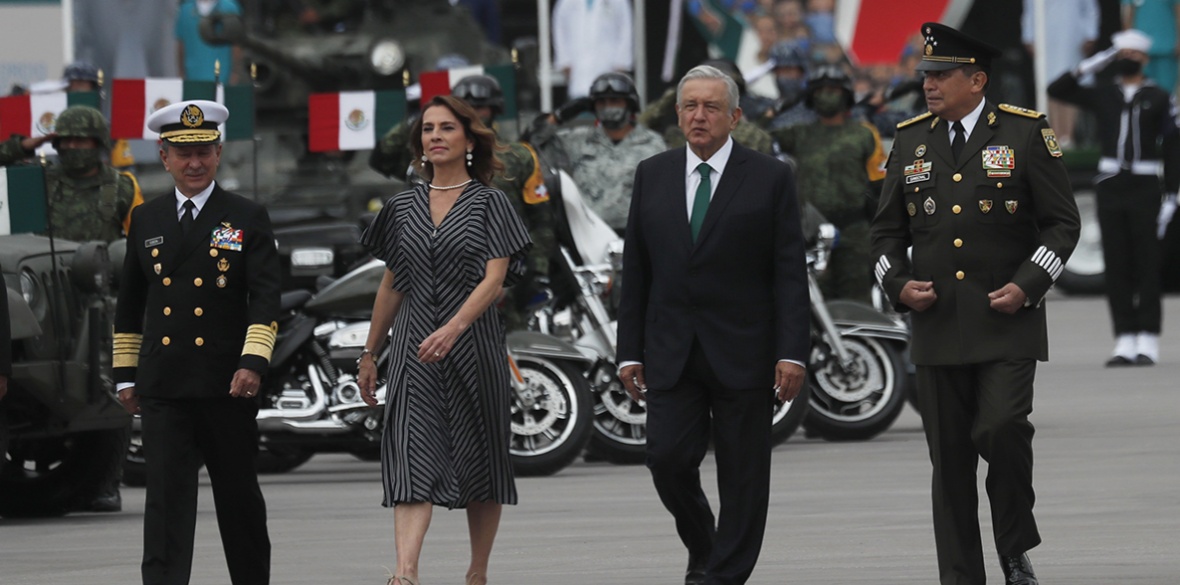This is the last article you can read this month
You can read more article this month
You can read more articles this month
Sorry your limit is up for this month
Reset on:
Please help support the Morning Star by subscribing here
PROGRESSIVE Mexican President Andres Manuel Lopez Obrador (Amlo) has in the two years since his election concentrated his efforts on two main goals: justice for the poor and ending corruption and impunity.
With the slogan “For the good of all, the poor come first!” Amlo has launched a raft of programmes to benefit the deprived and excluded: proper universal old-age pensions, a Mexican NHS with free and universal coverage, scholarships for millions of school and university students, a huge agro-forestry programme for peasant farmers, grants and low-interest loans without collateral for small businesses, much improved labour laws, and jobs in major public works schemes, among other things.
Returning stolen goods to the people
All of this has been achieved without raising taxes but by reducing inflated salaries, expenses and privileges of all high officials including the president himself, ending tax evasion, prosecuting those responsible for corrupt sweetheart deals and privatisations and ensuring that the proceeds of such crimes are collected and invested in public services and infrastructure.
The “Institute for Returning Stolen Goods to the People” is a central component of this process, together with an independent and determined attorney-general and a criminal-investigations team working to bring corrupt and repressive officials to justice.
In the past few months the legal process has come to a head with the arrest and charging of several prominent individuals, notably Emilio Lozoya, head of Pemex (the national oil company) under president Enrique Pena Nieto (2012-18) and Genaro Garcia Luna, Secretary of Public Security Under President Felipe Calderon (2006-12).
Lozoya was extradited to Mexico from Spain in July and has been spilling the beans on bribery and corruption worth hundreds of millions of dollars in the privatisation schemes of Pena Nieto: prominent in those shady deals was the notorious Brazilian Odebrecht company whose sleazy operations have already caused scandals in several Latin American countries.
Garcia Luna was arrested in the US on narcotics and money-laundering charges in a high-profile case still under way in New York: co-operation from Mexico has been of assistance in the case.
The issue here is that president Calderon launched a very violent and counter-productive “war on drugs” which caused a bloodbath in Mexico with the loss of many innocent lives, and evidence suggests that Garcia Luna negotiated a deal to protect the Sinaloa Cartel while going after other drug outfits.
Calderon is also suspected of having authorised an illegal covert intervention in Mexico by armed US agents.
Former presidents may face trial
Several other officials, including former ministers and state governors, have been charged or are under investigation.
But the biggest, and indeed explosive, issue here is that former presidents themselves may well be found guilty if brought to trial: Calderon and Pena Nieto for sure, and possibly others from the neoliberal era going back to 1988.
Under the constitution presidents enjoy immunity from prosecution except for treason or a very few other categories of serious crime.
Amlo wants to remove this immunity for both former and serving presidents: he has already succeeded in getting corruption classified as a serious crime for which they can be prosecuted.
Amlo wants to avoid any accusation by the opposition that he is conducting a vendetta against his predecessors, and made it clear that any decision to prosecute them should be taken democratically by the people in a referendum (“consultation”).
Constitutionally such a consultation could be held along with next June’s mid-term elections, and the deadline for authorising it was September 15.
In a climate of mounting tension, Amlo formally announced on the morning of September 15 that he was asking the Mexican Congress to authorise such a consultation.
Congress did so that very afternoon, and a popular petition on the matter (which needed two million signatures to be valid) reached and exceeded its target with 2.7 million. The matter now goes to the Supreme Court.
As was to be expected, there is an outcry from the conservative opposition (including many of those linked to former administrations), from most of the media and prominent intellectuals.
They claim that the signatures are false, that Amlo is persecuting the opposition and is intimidating the media, when he has gone out of his way to ensure freedom of the press, democratic rights and judicial impartiality.
Growing confrontation
Indeed Amlo has declared that in the referendum he himself will vote against prosecuting the ex-presidents because he does not want revenge: what he wants is to reveal the truth and to discredit those responsible for corruption rather than punish them, and above all to prevent future corruption.
But if the people vote for prosecutions to take place, he will obey their democratic will.
In all his actions so far Amlo has shown great skill in avoiding or minimising confrontation, but he knows it cannot be avoided.
In his speeches he condemns neoliberalism as the source of corruption, criticises conservatives as hypocrites, and calls for peace and equality both domestic and international.
September 16 is Mexican Independence Day, and Amlo presided over the traditional military parade and proclaimed the “Grito,” the Shout of Independence, but with additions of his own: “Vivas” to the native peoples, to the female as well as male heroes of independence, to democracy, equality and universal fraternity, and to Hope for the Future.
He has drawn a line in the sand, and from now on we can expect the struggle over Mexico’s future to intensify.











